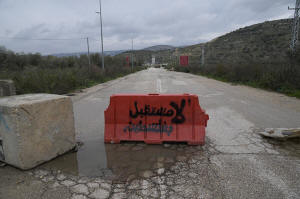Israel's West Bank crackdown triggers a wave of displacement unseen in
decades
 Send a link to a friend
Send a link to a friend
 [February 19, 2025]
By ISABEL DEBRE [February 19, 2025]
By ISABEL DEBRE
FAR'A REFUGEE CAMP, West Bank (AP) — By car and on foot, through muddy
olive groves and snipers’ sight lines, tens of thousands of Palestinians
in recent weeks have fled Israeli military operations across the
northern West Bank — the largest displacement in the occupied territory
since the 1967 Mideast war.
After announcing a widespread crackdown against West Bank militants on
Jan. 21 — just two days after its ceasefire deal with Hamas in Gaza —
Israeli forces descended on the restive city of Jenin, as they have
dozens of times since Hamas’ Oct. 7, 2023, attack on Israel.
But unlike past operations, Israeli forces then pushed deeper and more
forcefully into several other nearby towns, including Tulkarem, Far’a
and Nur Shams, scattering families and stirring bitter memories of the
1948 war over Israel’s creation.
During that war, 700,000 Palestinians fled or were forced from their
homes in what is now Israel. That Nakba, or “catastrophe,” as
Palestinians call it, gave rise to the crowded West Bank towns now under
assault and still known as refugee camps.
“This is our nakba,” said Abed Sabagh, 53, who bundled his seven
children into the car on Feb. 9 as sound bombs blared in Nur Shams camp,
where he was born to parents who fled the 1948 war.
Tactics from Gaza
Humanitarian officials say they haven’t seen such displacement in the
West Bank since the 1967 Mideast war, when Israel captured the territory
west of the Jordan River, along with east Jerusalem and the Gaza Strip,
displacing another 300,000 Palestinians.

“This is unprecedented. When you add to this the destruction of
infrastructure, we’re reaching a point where the camps are becoming
uninhabitable," said Roland Friedrich, director of West Bank affairs for
the U.N. Palestinian refugee agency. More than 40,100 Palestinians have
fled their homes in the ongoing military operation, according to the
agency.
Experts say that Israel's tactics in the West Bank are becoming almost
indistinguishable from those deployed in Gaza. Already, President Donald
Trump's plan for the mass transfer of Palestinians out of Gaza has
emboldened Israel's far-right to renew calls for annexation of the West
Bank.
"The idea of ‘cleansing’ the land of Palestinians is more popular today
than ever before," said Yagil Levy, head of the Institute for the Study
of Civil-Military Relations at Britain’s Open University.
The Israeli army denies issuing evacuation orders in the West Bank. It
said troops secure passages for those wanting to leave on their own
accord.
Seven minutes to leave home
Over a dozen displaced Palestinians interviewed in the last week said
they did not flee their homes out of fear, but on the orders of Israeli
security forces. Associated Press journalists in the Nur Shams camp also
heard Israeli soldiers shouting through mosque megaphones, ordering
people to leave.
Some displaced families said soldiers were polite, knocking on doors and
assuring them they could return when the army left. Others said they
were ruthless, ransacking rooms, waving rifles and hustling residents
out of their homes despite pleas for more time.
“I was sobbing, asking them, ‘Why do you want me to leave my house?’ My
baby is upstairs, just let me get my baby please,’” Ayat Abdullah, 30,
recalled from a shelter for displaced people in the village of Kafr al-Labd.
“They gave us seven minutes. I brought my children, thank God. Nothing
else."
Told to make their own way, Abdullah trudged 10 kilometers (six miles)
on a path lighted only by the glow from her phone as rain turned the
ground to mud. She said she clutched her children tight, braving
possible snipers that had killed a 23-year-old pregnant woman just hours
earlier on Feb. 9.
Her 5-year-old son, Nidal, interrupted her story, pursing his lips
together to make a loud buzzing sound.
“You’re right, my love," she replied. “That’s the sound the drones made
when we left home.”
Hospitality, for now
In the nearby town of Anabta, volunteers moved in and out of mosques and
government buildings that have become makeshift shelters — delivering
donated blankets, serving bitter coffee, distributing boiled eggs for
breakfast and whipping up vats of rice and chicken for dinner.

[to top of second column]
|

A road barrier blocking access to the Ennab Israeli military
checkpoint, leading toward the northern West Bank city of Tulkarem,
reads "No future in Palestine," near the West Bank village of Ennab
Monday, Feb. 10, 2025. (AP Photo/Nasser Nasser)

Residents have opened their homes to families fleeing Nur Shams and
Tulkarem.
“This is our duty in the current security situation,” said Thabet
A’mar, the mayor of Anabta.
But he stressed that the town’s welcoming hand should not be
mistaken for anything more.
“We insist that their displacement is temporary,” he said.
Staying put
When the invasion started on Feb. 2, Israeli bulldozers ruptured
underground pipes. Taps ran dry. Sewage gushed. Internet service was
shut off. Schools closed. Food supplies dwindled. Explosions echoed.
Ahmad Sobuh could understand how his neighbors chose to flee the
Far’a refugee camp during Israel's 10-day incursion. But he
scavenged rainwater to drink and hunkered down in his home, swearing
to himself, his family and the Israeli soldiers knocking at his door
that he would stay.
The soldiers advised against that, informing Sobuh's family on Feb.
11 that, because a room had raised suspicion for containing security
cameras and an object resembling a weapon, they would blow up the
second floor.
The surveillance cameras, which Israeli soldiers argued could be
exploited by Palestinian militants, were not unusual in the volatile
neighborhood, Sobuh said, as families can observe street battles and
Israeli army operations from inside.
But the second claim sent him clambering upstairs, where he found
his nephew’s water pipe, shaped like a rifle.
Hours later, the explosion left his nephew's room naked to the wind
and shattered most others. It was too dangerous to stay.
“They are doing everything they can to push us out,” he said of
Israel's military, which, according to the U.N. agency for refugees,
has demolished hundreds of homes across the four camps this year.
The Israeli army has described its ongoing campaign as a crucial
counterterrorism effort to prevent attacks like Oct. 7, and said
steps were taken to mitigate the impact on civilians.
A chilling return
The first thing Doha Abu Dgehish noticed about her family's
five-story home 10 days after Israeli troops forced them to leave,
she said, was the smell.
Venturing inside as Israeli troops withdrew from Far'a camp, she
found rotten food and toilets piled with excrement. Pet parakeets
had vanished from their cages. Pages of the Quran had been defaced
with graphic drawings. Israeli forces had apparently used explosives
to blow every door off its hinges, even though none had been locked.

Rama, her 11-year-old daughter with Down syndrome, screamed upon
finding her doll’s skirt torn and its face covered with more graphic
drawings.
AP journalists visited the Abu Dgehish home on Feb. 12, hours after
their return.
Nearly two dozen Palestinians interviewed across the four West Bank
refugee camps this month described army units taking over civilian
homes to use as a dormitories, storerooms or lookout points. The Abu
Dgehish family accused Israeli soldiers of vandalizing their home,
as did multiple families in Far’a.
The Israeli army blamed militants for embedding themselves in
civilian infrastructure. Soldiers may be “required to operate from
civilian homes for varying periods," it said, adding that the
destruction of civilian property was a violation of the military's
rules and does not conform to its values.
It said “any exceptional incidents that raise concerns regarding a
deviation from these orders” are “thoroughly addressed,” without
elaborating.
For Abu Dgehish, the mess was emblematic of the emotional whiplash
of return. No one knows when they’ll have to flee again.
“It’s like they want us to feel that we’re never safe,” she said.
”That we have no control.”
All contents © copyright 2025 Associated Press. All rights reserved |